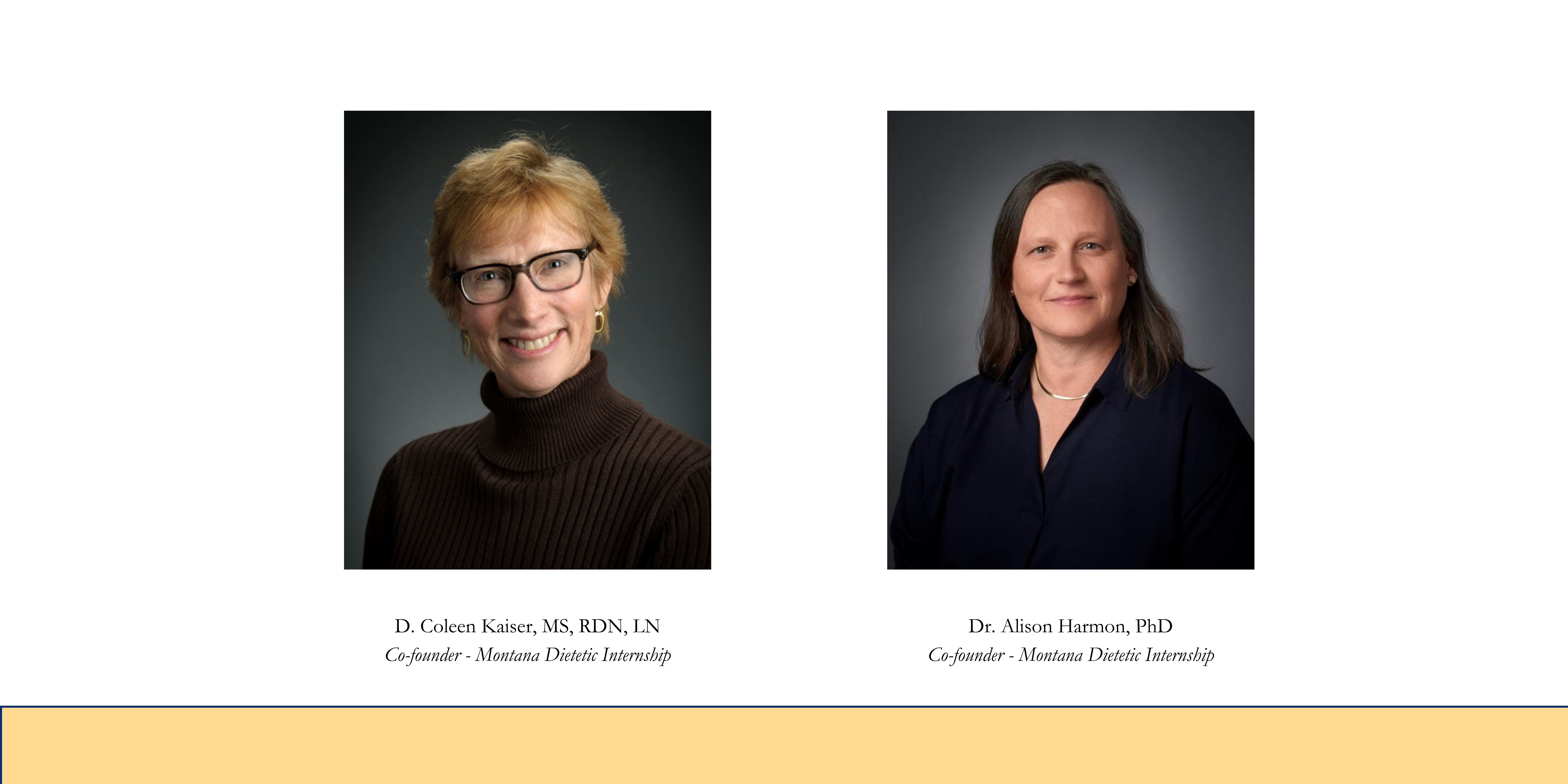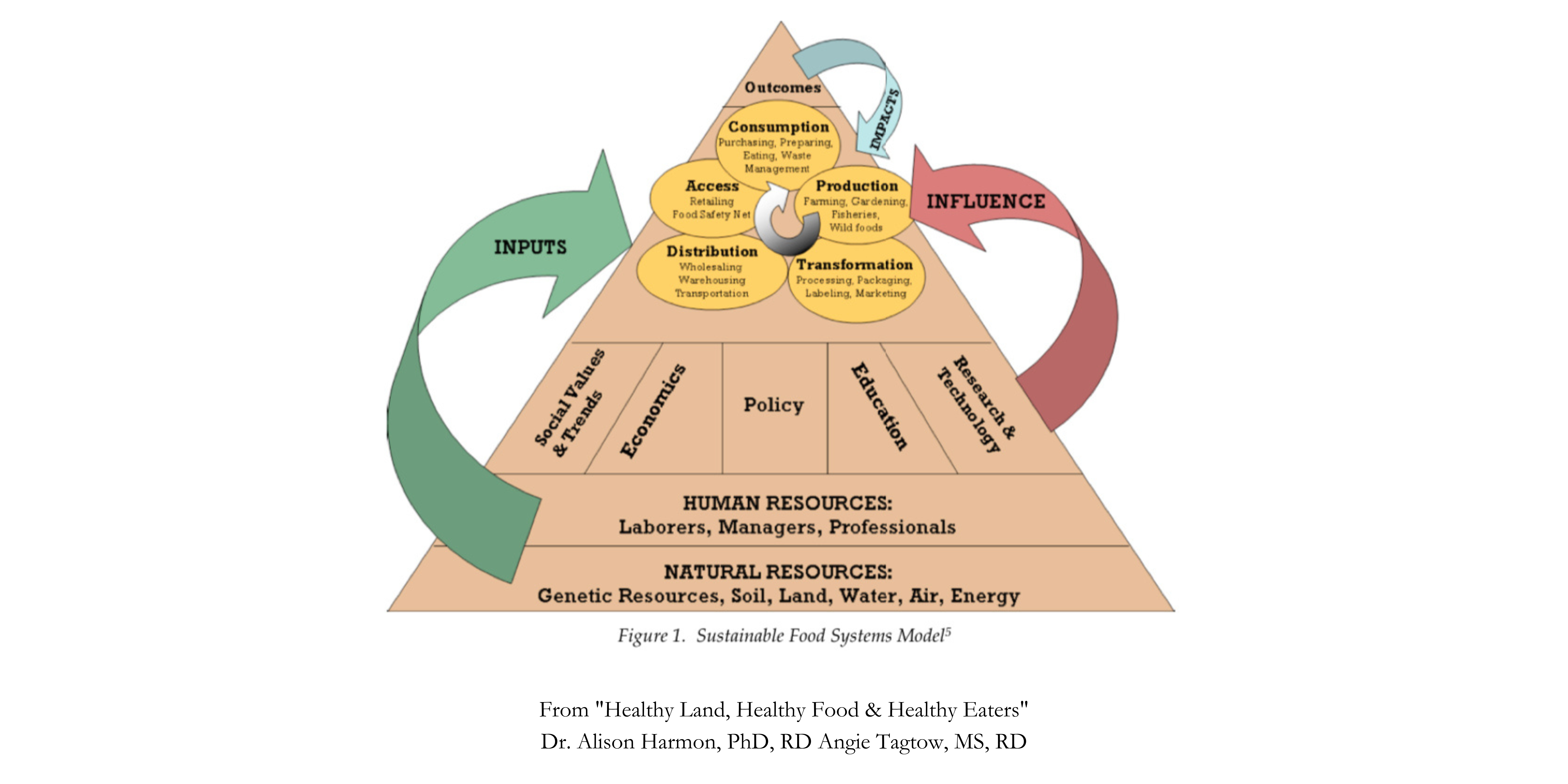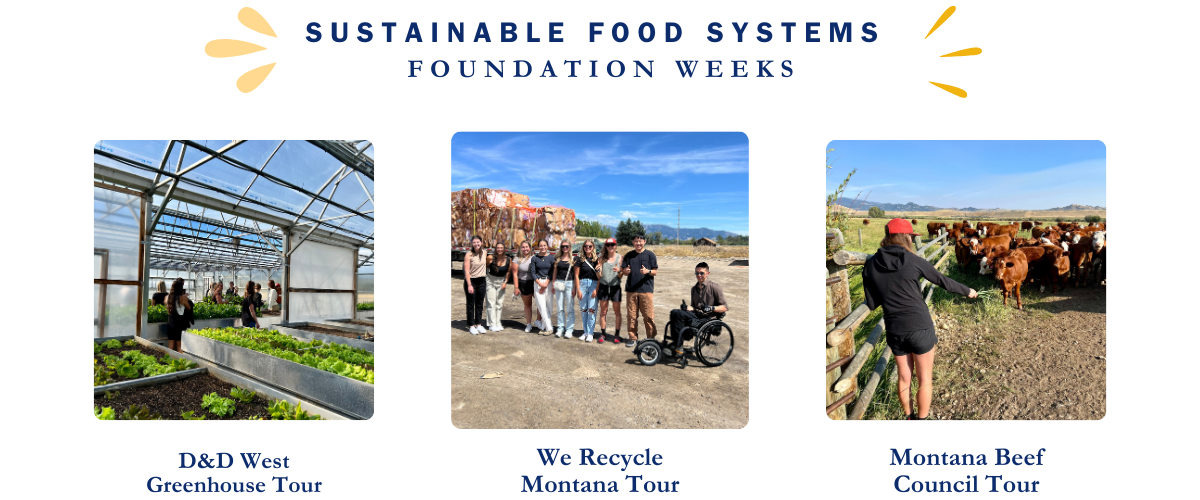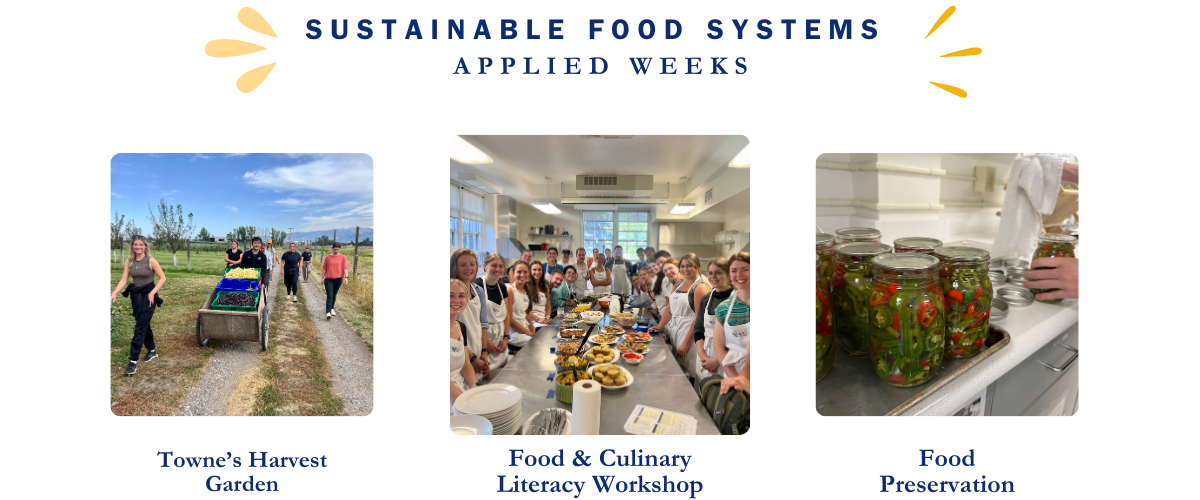Program Overview
2026 Spring Open House | Missed MDIGP Open House? Watch the recording below and learn more about the program.
Program Pathways
Designed for students who wish to simultaneously complete a Dietetic Internship and a Master of Science degree in Dietetic Systems Leadership (MSDI).
The MSDI is a continuous, two-year graduate program that integrates didactic coursework
with supervised dietetic practice. The curriculum includes online master’s-level courses,
elective study with a policy emphasis option, and a structured dietetic internship
featuring immersive experiences in sustainable food systems and professional practice.
Supervised practice is completed across clinical, community, and foodservice management
settings within Montana and the Rocky Mountain region. Program graduates earn a Master of Science degree, receive a Dietetic Internship verification statement, and are eligible to sit for the Registered Dietitian Nutritionist (RDN) credentialing examination.
The Montana Dietetic Internship (DI) Non-Degree Certificate is designed for applicants who already hold a master’s degree and a Didactic Program in Dietetics (DPD) verification statement. This two-semester internship emphasizes sustainable food systems and includes required coursework and supervised practice experiences.
Accelerated 4+1 Program Pathway. In addition, MSU offers an Accelerated 4+1 Program that allows students to earn a Bachelor of Science in Food and Nutrition and a DPD verification statement in four years, followed by completion of the Master of Science in Dietetic Systems Leadership and Dietetic Internship in the fifth year.
Program Benefits

Diverse Pathways
Choose between a Master of Science & Dietetic Internship (MSDI) or a Non-Degree Graduate prepared Dietetic Internship (DI).
Strong Career Preparation
Develop leadership, critical thinking, and problem-solving skills to become an innovative dietitian.
Rural & Urban Healthcare Exposure
Experience in both large hospital systems and critical access hospitals in Montana & Wyoming.
Sustainable Food Systems Focus
Unique emphasis on sustainability, including work at Towne’s Harvest Garden and tours of the greater Gallatin Valley food system.
Integrated Learning Experience
Hands-on training in clinical nutrition, community nutrition, and foodservice management.
Interdisciplinary Collaboration
Engage in Culinary Medicine sessions and projects with nursing and medical students.Introduction
The Montana Dietetic Internship & Graduate Program (MDIGP) integrates experiences in clinical and community nutrition, and foodservice management with a sustainable food systems focus to provide a unique and progressive supervised dietetic practice experience to future registered dietitians.
Surrounded by mountains and farmland, Montana State University offers the perfect backdrop for dietetic interns interested in food systems and sustainable practices. Students will have the opportunity to work at MSU's Towne’s Harvest Garden, participate in field trips to local farms/ranches and lead interprofessional projects such as Culinary Medicine sessions with nursing and medical students.
The program prepares future dietitians to be innovative leaders in the implementation of sustainable food practices in all areas of dietetics. Interns spend 9 -13 weeks in a large hospital system in a more urban area and 2 weeks in one of the many critical access hospitals that serve the rural areas. Montana and Wyoming are both primarily rural with unique considerations for access to healthcare. Our dedicated facilities and preceptors provide MDI interns with opportunities to practice their clinical skills, with the unique lens in SFS, with a rural healthcare focus.
Mission
We prepare future RDNs to lead sustainable health solutions for people and the planet focusing on dietetics practice in Montana and the Rocky Mountain Region.
Program Values
- Challenge students to discover and develop their passions
-
Foster holistic personal and professional development
- Practice and cultivate transdisciplinary inquiry and systems thinking
- Act with integrity and work towards a more just, inclusive, and livable future
Acting in alignment with MDIG values facilitates a dietetics systems leadership approach. The dietetic systems leadership model pillars are:
Systems Thinking: Recognize and synthesize patters, interactions and interdependencies in a set of activities designed for a specific purpose
- Foundational knowledge: individual + policy, systems and environmental (I+PSE) conceptual framework for action, social determinants of health, UNESCO cross-cutting and specialized sustainable development goals (SDG) competencies
Personal Empowerment: Increase self-efficacy and professional growth
- Foundational knowledge: growth mindset, mindfulness, critical thinking, communication skills, True Colors ™ self-discovery activities
Dietetics Competencies: Demonstrate nutrition care for individuals + policies, systems and environments
- Foundational knowledge: Didactic program in dietetics and Dietetic Systems Leadership coursework in research, evidence-based practice, clinical, public health and policy, and food service management dietetics practice.
Collective Care: Shared responsibility for each community member’s wellbeing.
- Foundational knowledge: weight inclusivity, cultural humility, LGBTQ+ healthcare allyship, Indian Education for All, trauma-informed nutrition care.
Goal 1
Graduates of the program will be highly capable entry-level registered dietitian nutritionists that can integrate sustainable food systems into dietetic practice.
Program Objective Measures
- At least 80 percent of interns complete program requirements within 32 months for MSDI pathway and 14 months for DI-only pathway (approx. 150% of the program length).*
- 100 percent of interns will pass NUTR 560: Food Systems Leadership for Nutrition Professionals with at least a 3.0 on a 4-point grade scale.
- At least 90 percent of interns receive a dietetic internship verification statement, reflecting an overall average rating from preceptors of 3 or greater on a 5-point Likert scale (3 = Doing well, performing as expected for intern level) after each rotation.
- At least 90 percent of graduates will rate their internship experience on how well prepared for entry-level practice they are with an overall average rating of 4 or greater on a 5-point Likert scale (4 = satisfied).
- At least 90 percent of program graduates take the CDR credentialing exam for Register Dietitian Nutritionist within 12 months of program completion.
- The program's one-year pass rate (graduates who pass the registration exam within one year of first attempt) on the CDR credentialing exam for Register Dietitian Nutritionist is at least 80 percent.
- Of graduates who seek employment, at least 70 percent are employed in nutrition and dietetics or related fields within 12 months of graduation.
- At least 80 percent of employers will rate employees who are program graduates with an overall average rating of 4 or greater on a 5-point Likert scale (4 = satisfied).
Goal 2
The MDI program prepares entry-level registered dietitian nutritionists who will serve the needs and enrich the well-being of diverse populations in Montana and the Rocky Mountain region.
Program Objective Measures
- Within five years, 25 percent of MDI RDs will serve the populations of Montana and Rocky Mountain region through employment or volunteer service.
Program outcome data available upon request.
2025 Virtual Open House
The Montana Dietetic Internship & Graduate Program is one of the few internships in the nation to offer a specialized focus in Sustainable Food Systems (SFS).
To develop dietetics system leaders who can think creatively and apply innovative solutions to real-world challenges, we teach interns to approach probelm solving through the unique lenses of SFS and rural healthcare. Through a dedicated four-week exploration of the Gallatin Valley’s dynamic food system, interns gain hands-on experience and a deeper understanding of how sustainable food practices can improve both individual and community health.
This immersive experience equips interns with strong systems thinking and critical problem-solving skills, empowering them to become influential change agents in shaping healthier, more sustainable food systems in their professional careers.
Developing the Sustainable Food System Focus
The MDIGP's Sustainable Food Systems focus was developed by Co-Founders Coleen Kaiser, MS, RDN and Dr. Alison Harmon, PhD, RDN who were a trailblazers in advocating for the inclusion of sustainable food systems education in dietetics long before it became a standard competency for Registered Dietitian Nutritionists (RDNs). Dr. Harmon’s early work in developing Towne's Harvest Garden and creating a food systems model laid the foundation for MDI’s commitment to sustainability in the field of dietetics. Today, MDI continues to incorporate Healthy Land, Healthy People by Dr. Alison Harmon and Angie Tagtow into its curriculum.

MDI honors Dr. Harmon’s foundational contribution by prioritizing sustainable food systems for future dietitians. Through collaboration with local and global partners, the MDI develops dietetics professionals who lead the transition toward more sustainable, resilient, and healthy food systems (Standards of Professional Performance). Graduates are equipped to drive change across individuals, policies, systems, and environments, shaping future food systems.

Foundation Weeks
What to expect:
- Two weeks with MDI cohort
- Mix of classroom and field work
- Systems thinking review
- Tour of the Gallatin Valley and greater Montana Food System

Applied Weeks
What to expect:
- Two-week applied practice in small groups
- Hands-on experience at Towne's Harvest Garden, a 3-acre organic farm on MSU campus.
- Food is Life - An interprofessional approach to food as medicine. Interactive learning in food literacy, gut health and adverse food reactions with medical and nursing students.
- Hot Topic Lunch & Learn - Present on key SFS topics and prepare and enjoy a farm-fresh lunch together during the session.
- Local Food Preservation - Full day of hands-on experience with canning, drying and fermenting.

Estimated MSDI Tuition and Fees for 2025-27 cohort***
|
MDI Application Fee*
|
$57 |
|
Program Enrollment Fee**^
|
$11,220
|
|
36 Graduate Credits, Tuition + Fees*** (Resident)
|
$12,689
|
|
36Graduate Credits,Tuition + Fees*** (Non-Resident)
|
$16,479
|
|
Total
|
$23,966 Resident) $27,756 (Non-Resident) |
Estimated Non-Degree DI Tuition and Fees for 2025-26 cohort**
|
MDI Application Fee*
|
$57
|
|
Program Enrollment Fee**^
|
$11,220
|
|
12 Graduate Credits Tuition Fee** (Resident)
|
$4,227
|
|
12 Graduate Credits Tuition Fee** (Non-Resident)
|
$5,666
|
|
Total
|
$15,544 (Resident) $16,943 (Non-Resident) |
*The nonrefundable MDI application fee is separate from the DICAS application fee and should be postmarked by the application deadline.
**All fees subject to change according to Montana Board of Regents directive updates.
^The Program Enrollment fee is assessed during the supervised practice semesters, half ($5,610) in Fall and half in spring semester of the second year.
*** Tuition fees for the MS/MDI degree are based on estimated graduate level tuition and student fees for the current year and are subject to change.
Billing Timeline
| Tuition & Fees |
Fa '25 6 cr |
Sp '26 6 cr |
Electives 6 cr |
Year 1 Subtotal |
Fa '26 9 cr |
Sp '27 9 cr |
Year 2 Subtotal | Total |
| Resident**^ | $2133 | $2133 | $2133 | $6457 | $3144 | $3144 | $17,509 | $23,966 |
| Non-Resident**^ | $2698 | $2698 | $2698 | $8,150 | $4193 | $4193 | $19,606 | $27,756 |
| Application Fee | $57 | Program Fee | $5610 | $5610 | $11,220 | |||
| Curriculum |
HHD 501, NUTR 528 |
HHD 512, NUTR 525 |
Policy choice + Elective |
NUTR 560, NUTR 598, NUTR 575 |
NUTR 598, NUTR 575 |
36 Credits |
||
|
|
|
|
|
|
Intern Estimated Living Expenses
| Travel (will vary according to location, vehicle and insurance) | $1,500 |
| Housing (interns report $1200-1700/mo) |
$10,000-$15,000/ 9 mos |
| Optional books and supplies | $300-500 |
| Medical exams, immunizations, etc. | $150 |
| Health insurance (will vary according to coverage) | $2,000 |
| Laptop computer with internet capability | $1,500 |
| Academy of Nutrition & Dietetics student membership | $58 |
| Online Records Management Systems DI year (background check, drug screen immunization records, and tracking & evaluations) | $150 |
Program Fee
- Professional liability insurance coverage
- Supervised practice facility compensation
- MSU library access
- Orientation speaker honoraria, meals, and tour fees and transportation
- Supervised practice travel
- Graduation week speaker honoraria
- Competency tracking software
- Canva subscription
- MTAND Food & Nutrition Summit attendance
- RDN exam preparation
Financial Aid
Both programs meet the requirements for federal financial aid in semesters when students are registered for at least 6 credits.
Additionally, other assistance may be available to interns in the form of scholarships and short-term loans depending on individual eligibility. Loan information and applications are available from the Office of Financial Aid Services located in the Student Union Building at MSU-Bozeman or on the MSU website. The MSU Financial Aid Office telephone number is (406) 994-2845.
Scholarships
The program has several individual scholarships totalling $20,000 available to Montana Dietetic Interns in the supervise practice year.
Interns may also want to consider national scholarship programs and are encouraged to apply directly to: The Academy of Nutrition and Dietetics
Contact information for questions regarding the AND application process can be directed to Academy of Nutrition and Dietetics Foundation (800) 877-100, ext. 1133
Or email: scholarship@eatright.org
Visit program pathway pages:
- Nonrefundable Application Fee: To be considered, send an application fee of $57 directly to MDI postmarked by the
application deadline. (This is a separate fee from the DICAS fees.)
- Please pay online (preferred) or
- Make checks payable to Montana Dietetic Internship and mail to: Montana Dietetic Internship,Montana State University,PO Box 173370, Bozeman, MT 59717-3370
- Submit application materials through the Dietetic Internship Computer Application Service (DICAS) Portal by the appropriate deadline. Resources including instructional videos for using DICAS are available from ACEND.
- Do not apply to the MSU Graduate school unless directed by the MDI team.
Accepting applications in DICAS October 19th for Fall 2026 start.
Selection Process |
Application deadline through the DICAS PortalApplication fee paid to MDI |
Interviews |
Notification of Program Decision |
Confirm Acceptance with MDI Directors by phone or email |
Non-refundable $1000 Deposit paid or postmarked to MDI by |
Early Selection for MSU grads |
Sunday, October 12th, 2025, 11:59 pm MST |
Oct 13-16 |
Friday, October 17th, 2025 |
Monday, October 20th, 2025, 5:00 PM MST |
Monday, October 27th, 2025, 5 PM MST |
National - Fall Priority Deadline |
Priority Deadline Sunday, October 19th, 2025, 11:59 pm MST |
October 21-29 |
Friday, October 31st, 2025 |
Saturday, November 15th, 2025 |
Friday, November 21st, 2025 |
National - Spring Priority Deadline |
Priority Deadline Sunday, February 8th, 2026, 11:59 pm MDT |
February 10 - 17 |
Friday, February 27th, 2026 |
Sunday, March 15th, 2026 |
Monday, March 23rd, 2026 |
Early selection applicants must be:
- Montana State University grads completed with, or near completion of, a degree from MSU with the Didactic Program in Dietetics Verification Statement from the Department of Food Systems, Nutrition & Kinesiology.
- Submit your application through the DICAS Portal indicating "Montana Dietetic Internship- Internal MSU Applicants Only"
Notice – MDI students are required to complete a background check. Applicants shall include in the ‘Background Section’ of their DICAS application any information that could appear in a background check. Background checks are comprehensive and can include findings such as all arrests and criminal charges even if dismissed or deferred, as well as expunged records. Failure to disclose a discrepancy could have worse consequences than not disclosing on DICAS if discovered later upon review of a background check report and may be cause for termination from the program.
